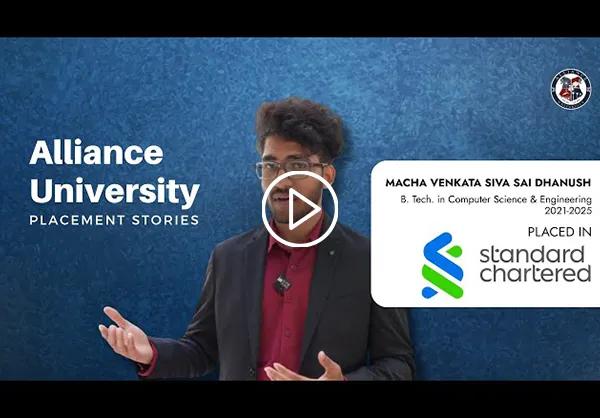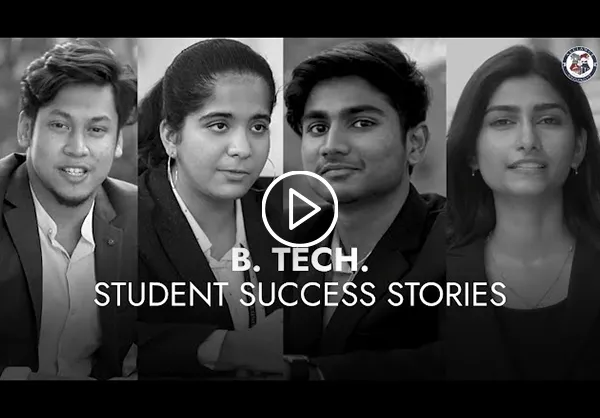I'm delighted to study at Alliance University. I went from being a shy, introverted ...
Admission Enquiry
HELPLINE:
+91 96060 48544 / 96200 09825
Programs
B. Tech. in Computer Science & Engineering
Overview
The B. Tech in Computer Science and Engineering (CSE) is a 4-year (8-semester) undergraduate program designed to meet the dynamic demands of industry. Spanning core and advanced topics, it equips students with skills in programming, algorithms, and system design, aligning with industry needs for innovative, problem-solving professionals. Curriculum emphasizes practical skills through Design Projects, Capstone Projects, Industry Internships and hackathons ensuring graduates are job ready. Emerging technologies like machine learning, IoT and Embedded Systems, and cyber security are integrated via electives, catering to roles in industries, startups, and research. Graduates pursue careers as software engineers, data scientists, or system architects, with attractive packages meeting the industry’s need for versatile, skilled engineers.
Duration
B. Tech. (Regular): Four Years (Full-time)
B. Tech. (Lateral): Three Years (Full-time)
Programs Offered
- Block Chain Technologies
- Cloud Computing
- Cyber Security
- DevOps
- Full Stack Development
- Internet of Things (IoT)
Commence of the course
January 2020 & July 2020
Course Duration
4 Years
Mode of Study
Full Time Course
Eligibility
For Regular
10+2 from recognized Board / Council with Minimum 50% marks in Physics & Mathematics as compulsory subjects along with one of the Chemistry / Biotechnology / Biology / Technical Vocational Subject.
Score in JEE (Main); JEE (Advanced); Karnataka CET; COMED-K; AUEET (Alliance Undergraduate Engineering Entrance Test); or any other State-Level engineering entrance examination.
For Lateral Entry
Passed Diploma examination with at least 50% marks in relevant branch of Engineering and Technology.
Passed B. Sc. Degree from a recognized University as defined by UGC, with at least 50% marks & passed 10+2 examination with Mathematics as a subject.
A relaxation of 5% marks or its equivalent grade may be allowed for those belonging to SC / ST.
Programme Features
Interdisciplinary Learning: Integrates knowledge from multiple fields, enhancing problem-solving and innovation through open electives and minors, fostering versatility and adaptability to meet complex, industry-relevant challenges.
Project Based Learning: An educational approach where students learn through hands-on, real-world projects to foster industry-relevant skills like innovation, teamwork, and problem-solving, preparing students for professional challenges.
Industry Alignment: Curricula meet current and future industry needs integrating real-world skills, technologies, and practices into courses, often through partnerships, internships, and projects fostering relevant expertise, problem-solving, and adaptability, aligning academic learning with professional demand.
Research Opportunities: Empower students to investigate advanced fields like AI, quantum computing, or cybersecurity through design projects, capstone projects theses, faculty partnerships, equipping them for R&D careers or advanced studies in cutting-edge technology domains.
Course Structure - Programs Offered
| Semester | Subject Title |
|---|---|
| IV | Introduction to Virtualization and Cloud Computing |
| Cloud Computing Architecture and Deployment Models | |
| V | Internet and Cloud Computing |
| Network Storage Technologies | |
| VI | Cloud Architecture and Computing |
| VII | Aglie Cloud Automation |
| Semester | Subject Title |
|---|---|
| IV | Fundamentals of cyber security |
| Cyber security algorithms | |
| V | Cyber Security Risk Management and Mitigation |
| Fundamentals of Blockchain and Cryprocurrencies | |
| VI | Mobile and Network based Ethical Hacking |
| VII | Cyber Security Standards Policies and Practices |
| Semester | Subject Title |
|---|---|
| IV | Machine Learning with Python |
| Topics in Artificial intelligence | |
| V | Algorithm for Intelligent Systems and Robotics |
| Advanced Machine Learning | |
| VI | Cognitive Analytics |
| VII | High Performance Computing |
| Semester | Subject Title |
|---|---|
| IV | Introduction to IOT |
| IoT Sensor Technologies | |
| V | IoT Architecture and its Protocols |
| IoT cloud and data analytics | |
| VI | Industrial IoT 4.0 |
| VII | Internet of Medical Things |
| Semester | Subject Title |
|---|---|
| IV | Introduction to Data Analytics |
| Introduction to Data Modeling and Processing | |
| V | Bigdata Analytics |
| Data Science with Python | |
| VI | Data Warehousing and Business Intelligence |
| VII | Data Visualization Techniques |
Program Structure
Electives
- Minor Elective I (Intellectual Property Rights)
- Minor Elective II (Entrepreneurship Management)
- Principles of Data communication
- Net Technology
- Object Oriented Modeling and Design
- Computer organization and architecture
- Introduction to Micro processors
- Distributed System
- Java Programming
- Theory of Computation
- Virtual Reality
- Artificial Intelligence
- Data Ware housing and Data Mining
- Computer Systems Performance Analysis
- Multi Agent System
- Scripting Language ( Pearl & Python)
- Mobile Computing
- Image Processing
- Wireless Sensor Network
- Advanced Computer Architecture
- Open Elective I (Data structures with C)
- Open Elective II (Object Oriented Programming with C++)
- Open Elective III (Computational Complexity)
- Open Elective IV (Compiler Design)
- Open Elective V (Data Science & Analytics)
- Career Development Program I (Communication and Soft Skills)
- Career Development Program II (Aptitude and Quantitative Skills)
- Career Development Program III (Critical Reasoning and Logical Skills)
- Career Development Program IV (Problem Solving Skills)
- Career Development Program V (Technical Capstone)
Note: An elective subject is offered in the B. Tech. in Computer Science and Engineering course only if a minimum number of students enroll in it.
Faculty
Contact for Admissions
-
 Call Us
Call Us+91 96060 48544, 96200 09825,
080 4619 9049 -
 Email Us
Email Usbtech@alliance.edu.in




